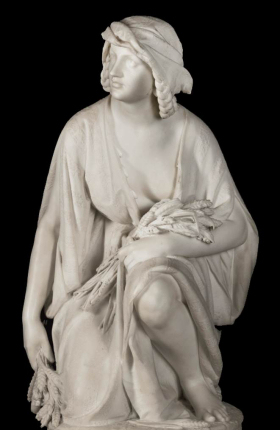Israel in Egypt
Our first example of how famine dramatically changed Biblical (and world) history starts with Abraham. In 1875 B.C. God informed the patriarch, during the making of one of the most major covenants in the Bible, that his descendants would be slaves in a foreign land for many years.
And He (God) said to Abram (Abraham), "You must surely know that your seed shall be sojourners in a land that is not theirs, (and shall serve them and they shall afflict them) four hundred years." (Genesis 15:13, HBFV).
Many years later Jacob's son Joseph (Abraham's great-grandson) ends up a slave in Egypt due to his brothers (Genesis 37). Joseph, after 13 years of trials in Egypt, correctly interprets Pharaoh's dream of 7 fat and 7 lean cows (Genesis 41). The dream predicts 7 years of bountiful harvests followed immediately by 7 years of famine to come upon Egypt, Canaan and the surrounding areas. Joseph is made the second most powerful person in Egypt as a reward (Genesis 41:39 - 46).

Fast forward nine years later when the land of Canaan has been experiencing a famine for two years (Genesis 45:6). The lack of food is so severe that Jacob (now named Israel) decides to migrate his entire family, which includes 11 sons, 1 daughter and their mates, to Egypt (Genesis 46)! God used a famine to drive his people into a foreign land 205 years after talking to his friend Abraham.
It took Joseph's death, 71 years after his family migrated, before Egypt began to enslave Israel (Exodus 1:8 - 13). Years later God would inspire Moses and Aaron to fulfill the second part of his prophecy to Abraham by leading His people back to Canaan (see Genesis 15:14).
Preparing for a King
God used a famine and the decisions it influenced to ultimately lead to Israel’s greatest human king being born!
A famine in Israel forces a couple named Elimelech and Naomi, along with their two sons, to leave Bethlehem for the country of Moab (Ruth 1:1). Elimelech, at an unknown time later, dies after which his two sons marry Moabite (non-Israelite or Gentile) women. Roughly ten years after these marriages both sons die, leaving their widowed mother Naomi without sons and any means of support.
Naomi, who now only has her sons widows Orpah and Ruth with her, makes the fateful decision to return to Bethlehem as there is no longer a famine in the land (Ruth 1:6). Orpah and Ruth accompany Naomi on part of her journey. They are soon told, however, to go back to Moab since their mother-in-law has nothing more to offer them (Ruth 1:8 - 9, 12 - 13).
Orpah decides to return to Moab. Ruth, however, maintains her steadfast love and devotion to Naomi. She knowingly chooses to leave the land of her birth so that she can be with and help her beloved relative.
"Do not beg me to leave you, to return from following after you. For where you go, I will go. Where you stay, I will stay. Your people shall be my people, and your God my God. Where you die, I will die, and there I will be buried. May the Lord do so to me, and more also, if anything but death parts you and me." (Ruth 1:16 - 17, HBFV).
A series of events, after arriving in Bethlehem, ultimately causes Ruth to meet and marry one of Elimelech's relatives named Boaz (Ruth 2:1). They produce a son named Obed who will turn out to be the grandfather of King David (Ruth 4:17) and in the physical lineage of Jesus Christ (Matthew 1:5, Luke 3:32)!
The Bible's Greatest Famine
Jesus predicted, in his famous Mount Olivet prophecies, that the greatest and most extensive famines humanity has experienced would be one of the heralding signs that his return (see Matthew 24:3) was fast approaching.
And you shall hear of wars and rumors of wars. See that you do not let these things disturb you. For it is necessary that all these things take place, but the end is not yet.
For nation shall rise against nation, and kingdom against kingdom; and there shall be famines and pestilences and earthquakes in different places. Now all these things are the beginning of sorrows (Matthew 24:6 - 7, HBFV, see also Luke 21, Mark 13).
The third of the famous four horsemen of the apocalypse parallels the famines prophesied by Christ in the Bible. The rider rides a black horse and carries a balance in his hand. Only this horse, of the four revealed in Revelation 6, comes with additional comments explaining the severity of what it will cause on the earth.
And I heard a voice in the midst of the four living creatures say, "A measure of wheat for a silver coin, and three measures of barley for a silver coin: and see that you do not damage the oil and the wine." (Revelation 6:6, HBFV).
A silver coin was considered the wages a laborer made in a day (see Matthew 20:2, 9). Under normal circumstances a silver coin could purchase between 16 and 20 measures of grains (Jamieson, Fausset and Brown Commentary). The end time high cost of food, due to factors such as war (Revelation 6:4), will require humans to pay far more than they ever have just to sustain their existence!
Global Consequences
The great famines Jesus discussed, which are also symbolized by Revelation's third horseman, begin to reach their peak during the devil's unfettered 42-month reign on earth as the Beast power (Revelation 11:2, 13:1 - 17). Prophetic Biblical conflicts and wars, with the famines, pestilences and diseases they bring, will lead to one-fourth of the earth's population dying (Revelation 6:8)!